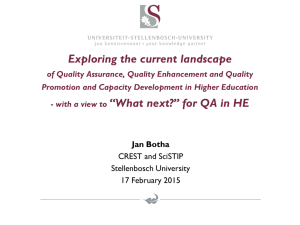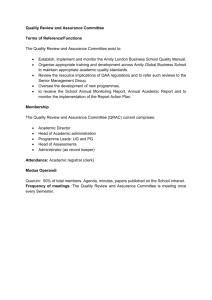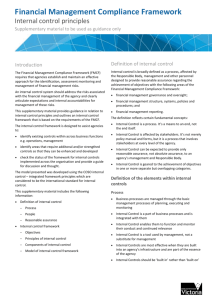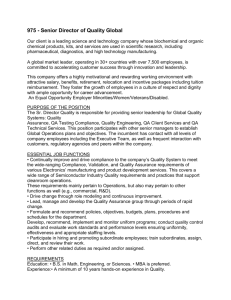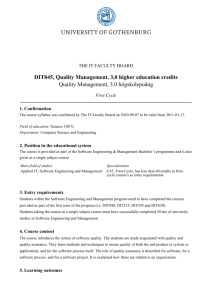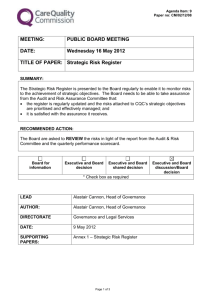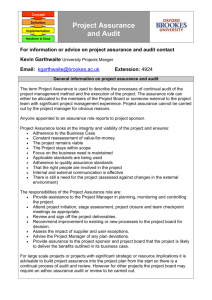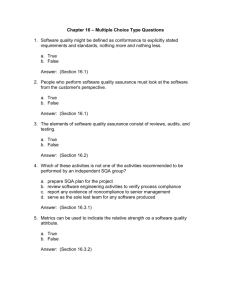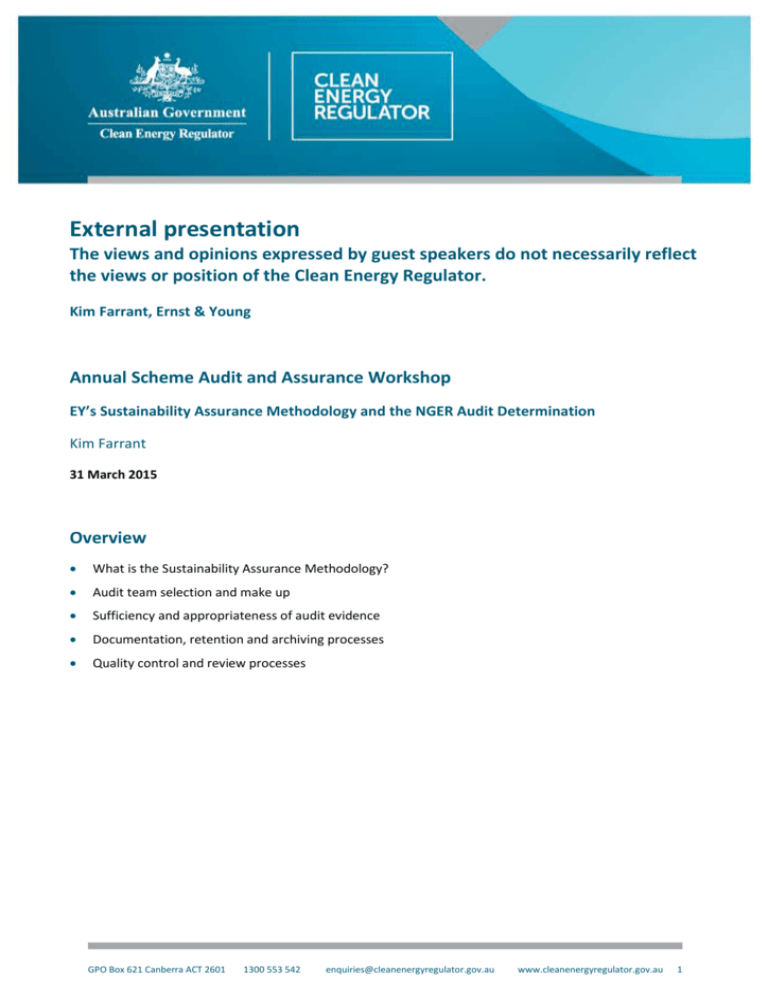
External presentation
The views and opinions expressed by guest speakers do not necessarily reflect
the views or position of the Clean Energy Regulator.
Kim Farrant, Ernst & Young
Annual Scheme Audit and Assurance Workshop
EY’s Sustainability Assurance Methodology and the NGER Audit Determination
Kim Farrant
31 March 2015
Overview
What is the Sustainability Assurance Methodology?
Audit team selection and make up
Sufficiency and appropriateness of audit evidence
Documentation, retention and archiving processes
Quality control and review processes
GPO Box 621 Canberra ACT 2601
1300 553 542
enquiries@cleanenergyregulator.gov.au
www.cleanenergyregulator.gov.au
1
What is EY SAM?
The Ernst & Young Global Sustainability Assurance Methodology (EY SAM) provides a global framework
for the application of a consistent thought process to all assurance engagements on sustainability
information.
EY SAM is based on the International Standard on Assurance Engagements 3000 Assurance engagements
other than audits or reviews of historical financial information (ISAE 3000) and is supplemented to
comply with the local assurance standards and regulatory or statutory requirements eg. NGER (Audit)
Determination
EY SAM reflects the typical flow of the execution of an assurance engagement in three broad phases:
»
Planning and risk assessment
»
Execution
»
Conclusion and reporting
These align with the following
phases from the NGER (Audit)
Determination
Planning
Performing
Reporting
Audit team selection and make up
What the NGER (Audit) Determination says….
Responsibility for selection of team rests with the audit team leader
Teams combined must have:
»
Knowledge to carry out audit
»
Skills to carry out audit
»
Availability to carry out audit
»
Supporting resources including equipment and access to key personnel
Teams are typically multidisciplinary and may include assurance practitioners, engineers, environmental
scientists and financial, legal or corporate experts
It may be necessary to bring in an external expert
GPO Box 621 Canberra ACT 2601
1300 553 542
enquiries@cleanenergyregulator.gov.au
www.cleanenergyregulator.gov.au
2
Audit team selection and make up
What we do….
Upfront when we meet with a client we have an idea of who will be the lead auditor and engagement
manager, but at this stage the broader audit team is yet to be determined
Only after developing an understanding of the auditee through risk assessment procedures, analytical
procedures, assessment of systems, processes and controls, are we able to design procedures according
to the risks identified and select a team
While EY has a team of 100 climate change and sustainability professionals including assurance
practitioners, engineers and environmental scientists, we also draw on the wider resources of the firm
eg. IT for controls testing
A specialised resourcing team ensures individuals aren’t over or under-committed
Where the assurance engagement includes aspects requiring specialized knowledge of another
profession (for example, a geologist), we consider the involvement of professionals with this knowledge
Sufficient and appropriate evidence
What the NGER (Audit) Determination says….
Collect sufficient and appropriate evidence to support the conclusion made
Additional guidance regarding sufficiency and appropriateness of evidence is provided by ASAE 3000 and
Guidance Statement GS 021 Engagements under the National Greenhouse and Energy Reporting
Scheme, Carbon Pricing Mechanism and Related Schemes, issued by the Auditing and Assurance
Standards Board (AUASB).
The auditor should consider the cost / benefit of the time taken to gather information against its
usefulness to support the assurance conclusion
»
however, the issue of difficulty is not in itself a valid basis for omitting or not performing evidence
gathering procedures for which there is no alternative, and
»
the audit team leader uses professional judgement and exercises professional scepticism in
evaluating the quantity and quality of evidence, and thus its sufficiency and appropriateness, to
support the assurance engagement report.
Guidance is provided in the handbook on substantive analytical procedures and tests of details.
GPO Box 621 Canberra ACT 2601
1300 553 542
enquiries@cleanenergyregulator.gov.au
www.cleanenergyregulator.gov.au
3
Sufficient and appropriate evidence
Assurance evidence comprises information that supports and corroborates managements assertions and
any information that contradicts such assertions
The absence of information also constitutes assurance evidence
Sufficiency and appropriateness of assurance evidence are interrelated
The greater the risk of misstatement, the greater the quantity of evidence required
Appropriateness of assurance evidence is its relevance and reliability in providing support for the
conclusion. Reliability is influenced by its source and nature, and is dependent on the circumstances
under which the evidence is obtained.
Determining whether we have obtained sufficient appropriate assurance evidence is a matter of
professional judgment.
GPO Box 621 Canberra ACT 2601
1300 553 542
enquiries@cleanenergyregulator.gov.au
www.cleanenergyregulator.gov.au
4
Sufficient and appropriate evidence
The glass of audit evidence
Filling the glass with sufficient appropriate
audit evidence
Design detection
risk
Detection
Risk
Assess combined
risk
Control Risk
Inherent risk
The extent of assurance procedures is unrelated to the engagement fee
If an issue is identified, it is a requirement that the team see the investigation of that issue through to its
conclusion
Documentation, retention and archiving
What the NGER (Audit) Determination says….
Assurance documentation is a key component of undertaking an assurance engagement.
It enables effective review and evaluation of the assurance evidence obtained
Provides a sufficient appropriate record of the basis for the audit report
Provides evidence the assurance engagement was performed in accordance with the NGER Audit
Determination
Relevant assurance engagement documentation must be kept for five years after the date the assurance
engagement report is signed.
GPO Box 621 Canberra ACT 2601
1300 553 542
enquiries@cleanenergyregulator.gov.au
www.cleanenergyregulator.gov.au
5
Documentation, retention and archiving
What we do….
Standardised document templates for key stages in the engagement
SharePoint based in-house system used to maintain all assurance documentation
Provide a comprehensive summary of the nature, timing and extent of procedures
Records results of the assurance procedures and assurance evidence obtained
Shows a history of timely review and approval by relevant team members
Archived to ensure retention requirements are met
Governance and review oversight
What the NGER (Audit) Determination says….
A robust system of quality control should be in place for all auditors.
Peer review is an important quality control process for assurance and verification engagements
undertaken under the National Greenhouse and Energy Reporting audit framework. The NGER Audit
Determination requires that the judgements made by the audit team leader in preparing and carrying
out the assurance engagement are peer reviewed by an impartial, objective and sufficiently qualified
person
Governance and review oversight
What we do…..
Maintain a registered of those authorised to sign assurance reports
Each key document and work paper is reviewed by another member of the audit team
Warm review – a review is conducted internally to ensure all quality processes have been adhered to
and to ensure consistency between engagements
Peer Review – a peer review is conducted in accordance with the requirements of the NGER (Audit)
Determination
Independent Partner Review – an independent partner review is conducted in relation to key assurance
documentation
GPO Box 621 Canberra ACT 2601
1300 553 542
enquiries@cleanenergyregulator.gov.au
www.cleanenergyregulator.gov.au
6
Contacts
Kim Farrant
EY Climate Change and Sustainability Services, Melbourne
Tel: +61 3 92888362
Kim.Farrant@au.ey.com
Copyright © 2015 Ernst & Young Australia. All Rights Reserved
This communication provides general information which is current as at the time of production. The
information contained in this communication does not constitute advice and should not be relied on as such.
Professional advice should be sought prior to any action being taken in reliance on any of the information.
Ernst & Young disclaims all responsibility and liability (including, without limitation, for any direct or indirect
or consequential costs, loss or damage or loss of profits) arising from anything done or omitted to be done
by any party in reliance, whether wholly or partially, on any of the information. Any party that relies on the
information does so at its own risk.
Liability limited by a scheme approved under Professional Standards Legislation.
GPO Box 621 Canberra ACT 2601
1300 553 542
enquiries@cleanenergyregulator.gov.au
www.cleanenergyregulator.gov.au
7


